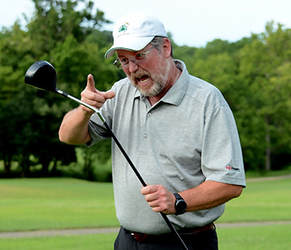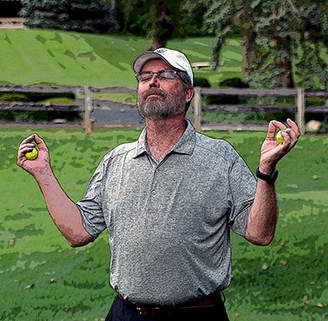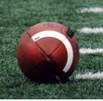Mind can be a source for good -- or -- bad golf
Part 1 dealt with Alderson’s evolution from a tour player to a golf instructor who embraces sports psychology as an improvement tool.)
By Mike Smith
Alderson’s maxim, “You cannot outperform your self-image” has a sensible ring to it. Doing something about that self-image, however, seems problematic for golfers like myself. We bear the mental scars from hundreds – or maybe even thousands (?) -- of errant shots.
Given that history, getting . . .

Then there is the shank that went nearly dead right onto another yard on the fourth hole. How long should it take to get that out of your mind?
Even professionals can have a negative “history” with a certain hole or course. Maybe it doesn’t set up well for their game. Maybe they had a past bad round while paired with a jerk.
Confidence, Alderson said, “is a non-renewable resource. It’s something that we love to have, and we always want more of it, but how do we get it? That’s the key.”
Alderson said he prefers to teach people the value of “unconditional” confidence.
With unconditional confidence, a person is “constantly depositing optimistic and positive things into (the) subconscious”
Even in unfavorable conditions or situations, “if you can engage your senses and your subconscious mind, you will believe you’ve actually done it (successfully before,)” he said. “If you’re playing with confidence, you’ll find yourself getting into a state of flow very often – and easily, as well.”
Ask to name a good example of a pro golfer who played with confidence and good game management, Alderson cited countryman Nick Faldo.
“He wasn’t the longest. He wasn’t the best in any department, but he kept the game pretty simple and played it like a game of chess. … He said the mind was his 15th club.”
“I would always counsel people to be a cheerleader for yourself. Accept that it’s not a game of perfect. You’re not perfect. Your swing is not perfect. … There is a solution, and typically it is the way you approach your game mentally.
“I’d say start with self talk. I think most of the things where we mess up is listening too much to what’s going on it our mind. I prefer to tell people to stop listening and start talking. Make yourself talk positive. Go on negativity fast. Don’t destroy yourself with negative thoughts, because you’ll sabotage your round every time.”
He continued, “Write yourself a couple affirmations … (such as) I love playing great golf. It’s like me to hit the ball straight. … Everything starts with the way that you talk to yourself.”
Of course, if self-communication proves difficult, there is yet another way to get those positive vibes flowing – hypnotism!

For those who are open to a deep hypnotic state, “we’re able to … deposit positive, optimistic, habit-changing thought that your subconscious mind will (use to) go off on a search to create evidence to support the belief.”
Has Alderson gotten any good feedback on the hypnotic help? “Oh, yeah – amazing,” he said, adding, “It’s available to everybody, but what is required is that (people) … realize their potential is going to come from how you utilize your mind more than the body.”
One 2011 report estimated that Americans spent an estimated $523 million on golf-related media, including books, magazines, DVDs and so forth. Of course, there is a plethora of free information online, as well. In any case, its evident golfers are keenly interested in improving their game. Is the ultimate answer somewhere up there between their ears? According to Alderson, the mind is no small part of the answer.


 RSS Feed
RSS Feed